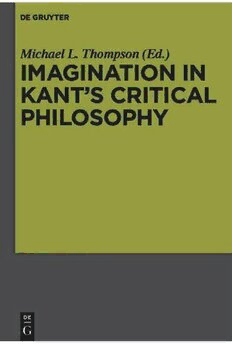
Imagination in Kant's Critical Philosophy PDF
Preview Imagination in Kant's Critical Philosophy
Imagination in Kant’s Critical Philosophy Imagination in Kant’s Critical Philosophy Edited by Michael L. Thompson DE GRUYTER ISBN978-3-11-027453-0 e-ISBN978-3-11-027465-3 LibraryofCongressCataloging-in-PublicationData ACIPcatalogrecordforthisbookhasbeenappliedforattheLibraryofCongress BibliographicinformationpublishedbytheDeutscheNationalbibliothek TheDeutscheNationalbibliothekliststhispublicationintheDeutscheNationalbibliografie; detailedbibliographicdataareavailableintheInternetathttp://dnb.dnb.de. ©2013WalterdeGruyterGmbH,Berlin/Boston Printingandbinding:Hubert&Co.GmbH&Co.KG,Göttingen Printedonacid-freepaper PrintedinGermany www.degruyter.com Contents Michael Thompson Introduction 1 Angelica Nuzzo Imaginative Sensibility Understanding, Sensibility, and Imagination in the Critique of Pure Reason 19 Christian Helmut Wenzel Art and Imagination in Mathematics 49 Gary Banham The Transcendental Synthesis of Imagination 69 Sidney Axinn Symbols, Mental Images, and the Imagination in Kant 97 Bernard Freydberg Functions of Imagination in Kant’s Moral Philosophy 105 Fernando Costa Mattos The Postulates of Pure Practical Reason A Possible Place for Imagination in Kant’s Moral Philosophy? 123 Jane Kneller Imagining our World Affinity and Hope in Kant’s Theory of Imagination 141 Emily Brady Imagination and Freedom in the Kantian Sublime 163 Martin Schönfeld Imagination, Progress and Evolution 183 Rudolf Makkreel Recontextualizing Kant’s Theory of Imagination 205 Index 221 Michael Thompson Introduction Imaginationcreatedtheworld¹ Throughthispassageofanindeterminate productofthefreepowerofimaginationtoits totaldeterminationinoneandthesameact, thatwhichoccursinmyconsciousnessbecomes animage[Bild]andispositedasanimage.It becomesmyproductbecauseImustpositit throughabsoluteself-activity.² ItislittlecoincidencethatimmediatelyfollowingthewidedistributionofKant’s philosophy we find a surge of literary and philosophical authors extolling the imagination as imperative to our cognitive functioning. Kant himself demon- strates the necessity and obscurity of this capacity in his famously cryptic pas- sage: Synthesisingeneral,asweshallhereaftersee,isthemereresultofthepowerofimagina- tion(Einbildungskraft),ablindbutindispensablefunctionofthesoul,withoutwhichwe shouldhavenoknowledgewhatsoever,butofwhichwearescarcelyeverconscious.³ Just what the imagination is and how it serves our varying mental activities in Kant presents a formidable challenge to any student of Kant’s philosophy. Part of this difficulty is due to conflicting and aporetic doctrines—amongst which onefindsthemostsalientandobscurediscussionssurroundKant’sviewofEin- bildungskraft. Thisbookaimstorecoverthelacunaandelucidatethisoftenoverlookedfac- ultyinImmanuelKant’scriticalphilosophy.Theprimarythesisinthisvolumeis thatthecomplexityandrobustnessofKant’smetaphysical,epistemological,aes- thetic and moral theories cannot be accounted for fully without appeal to the imaginationandtheproductsofitsactivities.Bysituatingtheimaginationwith- in the entirety of Kant’s critical philosophy a story about the imagination and Kant’scognitivearchitectoniccanbetold.Duetotechnicalvocabulary,complex- Baudalaire, Charles (1962): “La Reine des Facultés” in Curiosités esthétiques [et] L’Art ro- mantique.HLemaitre(Ed.)Paris:Garnier,p.321. Fichte,Johann Gottlieb (1991) The Science of Human Knowledge [Wissenschaftslehre] Heath andLachs(transl)Cambridge:CambridgeUniversityPress,p.3. Kant, Immanuel (1965):The Critique of Pure Reason A78/B103 trans. NormanKemp Smith. NewYork:Macmillan&Co,p.112. 2 MichaelThompson ity of thought and overall intricacy of Kant’s philosophical position, isolating any one element of his cognitive apparatus in order to make clear its function, status,roleandemploymentincognitionpresentsaninterpreterwithanumber of challenges. For example, isolating sensibility from the rest of the cognitive structures e.g. the understanding and reason, and determining its constituent role in knowledge production appears to be nearly impossible, if not entirely so. How can one understand this element without reference to its counterpart, and, furthermore, how can one clearly determine its role in cognition without the contraposing faculty with which it combines in knowledge production? By focusingon one element in Kant’s philosophy,one runs the riskof failing toil- lustrate said element’s proper place in Kant’s critical philosophy. And yet, one cannot understand Kant’s philosophy without providing an analytic of the ele- ments by means of which one can isolate constitutive parts, illustrate their roles and determine them in their interactions. For this volume, I would like toproposethatanisolationofoneelementisnotonlypossible,butalsoneces- saryinaninterpretation,defenseandemendationofKant’scriticalworks.Byfo- cusingontheimagination,onewillbeabletointerpretanddefendKant’scritical evaluationofscientific,metaphysical,practicalandaestheticknowledge.Thein- tent here is to focus on the imagination in order to gain greater insight on this “blind but indispensible function”. The Traditional Conversation One finds Kant’s initiallysubstantivediscussion of theimagination in asection ofhisCritiqueofPureReasonentitledtheTranscendentalDeductionoftheTable ofCategories;byKant’sownadmission,thesectionofthebookthatcosthimthe most labor. Instrumental in these most critical passages are his discussions of the varying roles the imagination plays in our cognitive processes, but, due to revisions, emendations and a seeming change in doctrine from his 1st Critique (1781,1787)tohis3rdCritique(CritiqueofJudgment1790),whatKant’sconsidered viewoftheimaginationisremainsunclearandhasbeenlargelyoverlooked.Sev- eralauthorseschewdiscussionofthisprimaryfaculty,dismissingitasarcanaof an obsolete faculty psychology. Even prominent Kant scholars have typically overlooked or marginalized pivotal sections of Kant’s works in order to avoid dealing with this issue. The reactions to Kant’s table of categories and his purported deduction of themareasvariableastheyarenumerous.Importantly,thevariousassessments of Kant’s critical exegesis of imagination are even more capricious than the es- timates of the deductions themselves. An exhaustive account here might take Introduction 3 ustoofarafieldfromthediscussionoftheimaginationinKant,butwecanelu- cidategeneraltrendsandobjectionsauthorshavenotedovertheyears.Themost general trend we find in these authors is a harsh critique leveled at what Kant has claimed to achieve in the transcendental deduction. Commonly, Kant is chargedwithhavingprovidedafacultypsychologythatexplainswhatprocesses areinplayinjudgments,eventheapriorigroundsby whichcognitionobtains, but, the criticism typically cites, the faculty psychology does not provide a de- tailedprocessoftheimaginationnoritsroleincategoryproduction,orhowsyn- thesisoccurs.Notably,HermannCohen⁴rejectsthedeductionofthetableofcat- egories, instead preferring toreadthe Transcendental Analytic in reverse order. Cohen begins with the Analytic of Principles and interprets them as an episte- mologyofNewtonianphysics.ByclaimingNewtonianphysicsasanapriorisci- enceoftheprinciplesofexperience,CohenarguesthattheKant’selucidationof the Analytic of Principles provides the principles applied in cognition and be- lieves the table of categories can be deduced therefrom.⁵ By demonstrating how knowledge is possible, i.e. the principles applied in judgment, Cohen be- lieves we can deduce the categories without the need to appeal to imagination as a synthetic function. In brief, Cohen argues that by knowing what it is that wecallknowledgeandhowwecometotheseclaims,wecandeducetheconstit- utive half of knowledge found in the understanding.This strategy may be the wayKantactuallyconceivedhiscritiqueofreason.Itisplausible thatKantpre- supposedEuclideangeometryasanaprioriscience,andproceededtoprovidea faculty psychology and the principles necessary to affirm this assumption. His presentation, however, proceeds in a very different manner.What Cohen fails to realize is that Newtonian physics cannot be an a priori natural science, be- cause the principles found in Newton are derived from experience, hence have anempiricalconditionandcannotbepureapriori,althoughtheymaybeapri- ori.⁶Lawsofgravitationandmomentummayseemtobeuniversalandnecessary FounderoftheMarburgschoolofneo-Kantianismcirca1902,whoseadherentsincludePaul Natorp,ErnstCassirer,andeventuallymanylogicalpositiviststhroughtheinfluenceofRudolph Carnap.ForfurtherdiscussionseeMichaelFriedman’s(2000)ThePartingoftheWaysChicago: OpenCourtpp.25–26. Cf.Cohen,Hermann(1918)Kant’sTheoriederErfahrung3rded.Berlin:B.Cassirerpp.345– 346.. IntheintroductiontoCPRKantmakesadistinctionbetweenpureaprioriandapriori.The formerindicatestheuniversalityandnecessityrequiredpriortoanyexperience.Thelattercan beconstruedasuniversalandnecessary,butaredependentuponempiricalconditions.Asan exampleofthelatter,Kantcitesthatwithproperunderstandingofstructuralengineering,one neednotunderminethefoundationsofahousetoknowthatifonedoes,theroofcollapses.One can know apriori what will happen,but this apriori knowledge is dependent upon the em-
